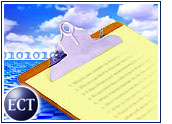
More and more airline tickets are being sold online.Eventually, the lion’s share will be sold not bythird-party sites like Travelocity and Expedia but bythe airlines themselves.
The airline business carries high costs and lowmargins, and air carriers are always trying to save abuck — usually at someone else’s expense. Whileemployees and passengers also have felt the sting ofcost cuts (just try getting a meal on a flight that is lessthan two hours long these days), travel agents havesuffered the cruelest blow.
Commission Cuts
From February 1995 to August 2001, travel agents sawairline ticket commissions plunge from a straight 10percent to 5 percent with a US$20 per-ticket cap.
Online travel agents have faced similar stinginess. Sofar, only two major airlines have eliminated onlinecommissions completely, but it is only a matter of timebefore online commissions become a thing of the past.
In March, NorthwestAirlines said it would stop paying commissions foronline ticket purchases. Travelocity retaliated byslapping a $10 fee on all Northwest tickets. Lastweek, the two came to an undisclosed accommodation andTravelocity agreed to remove the fee.
Southwest’s Example
But Northwest was not the pioneer in eliminating commissions; it was following the lead of SouthwestAirlines, which has never paid online commissions.Not coincidentally, Southwest is the only U.S. airlinewith 29 consecutive years of profitability under itsbelt. No other airline comes close to that record.
Southwest’s profitability is due in large part to itsmastery of cost control. It realized more quickly than other major airlines that it could make a bundle by booking tickets not just online, but also on its own Web site.
After cutting off Travelocity and the airline-ownedOrbitz last year, Southwest now makes all online sales– which last year accounted for 40 percent of totalbookings — through its own site.
Cost Savings
Why the focus on Internet sales over travel agents,online or offline? It is the cheapest known way for an airlineto sell tickets, and carriers need to save every penny.
Southwest, for example, pays $6 to $8 for each ticketsold through a travel agency but just $1 for each ticketsold on its site. Discount carrier AirTran has saidbookings on its site cost just 30 cents apiece, comparedwith $7 for bookings made through third-party sites.
Other airlines have been doing all they can toencourage customers to book on their sites, offeringfrequent-flyer bonuses; interactive seat selection;virtual check-in, including the ability to printboarding passes; and the ability to book awardtravel at reduced rates.
Those efforts are beginning to pay off. In January,Delta sold 545,000 tickets on its site, raking in $145million in revenue. That figure represented the airline’s best monthsince it began selling tickets online in 1996.
No Great Loss
Travel sites hate to lose market share to anyone, butin the case of airline tickets, they may be crying allthe way to the bank. Sales of other travel productslike hotels, cruises and vacation packages carry amuch higher margin than airline tickets.
Travelocity still depends on air ticket sales for 38 percentof its revenue, but the balance is shifting. Revenuefrom airline ticket sales was up 31 percent in 2001and down 9 percent year-over-year in the fourthquarter. Non-air revenue was up 71 percent for theyear and up 15 percent in the fourth quarter.
Expedia said its revenue from non-air sales was up 185percent in the fourth quarter, while commissionedsales were up 75 percent. The company said it expects just 15percent growth in air sales in 2002, compared with a125 percent increase in non-air revenue.
When it comes down to it, online sales of airlinetickets are more trouble than they’re worth toeveryone but the airlines.
Note: The opinions expressed by our columnists are their own and do not necessarily reflect the views of the E-Commerce Times or its management.

























































Social Media
See all Social Media